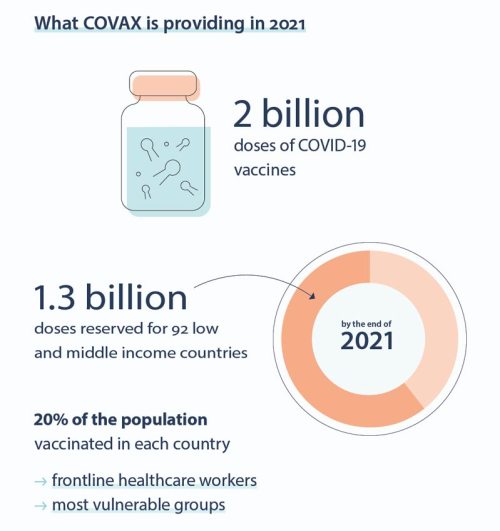We spoke to experts at CEPI and Gavi about how COVAX was set up, how it works, and its successes and challenges as it enters its second year.
First, some background: COVAX stands for ‘COVID-19 Vaccines Global Access’. As its name implies, it is a global initiative that aims to ensure access to safe and effective COVID-19 vaccines for every country in the world, regardless of its ability to pay.
COVAX is one of four pillars of the Access to COVID-19 Tools Accelerator (ACT-A) programme, and was established by the WHO, CEPI, Gavi, the European Commission and the French government in April 2020 – less than two months after the outbreak was officially declared a pandemic. Its aim: to ensure equitable access to tests, treatments and vaccines worldwide.
Billions of euros committed
A total of 191 countries, representing the majority of the world’s population, have joined COVAX, and 92 of these – all lower or lower-middle income countries – are eligible to receive vaccines through the COVAX Advance Market Commitment (COVAX AMC). This scheme covers at least part of the cost of the vaccines for each country, as well as guaranteeing an equitable supply.
High and middle-income countries can join as self-funding participants; they commit to purchasing quantities of vaccine doses through COVAX, and their upfront payments enable it to agree future supplies with manufacturers.
The COVAX programme has also received donations from many high-income countries, as well as private individuals and foundations. By mid-February this year nearly €5 billion had been pledged to the scheme.
Success so far
COVAX’s success can be measured in simple numerical terms. The first vaccine shipment through the COVAX scheme took place on 24 February 2021, when 600,000 doses of the Oxford/AstraZeneca vaccine were delivered to Accra, Ghana.
Only 42 days after that first shipment, COVAX had delivered over 38 million doses to 100 countries, many of which would have had no chance of obtaining vaccines on the open market.
And the programme has overcome many challenges in order to achieve this milestone. In mid-April 2021 it launched a campaign to raise a further €1.6 billion, and with this in place it should be confident of securing the two billion doses that it aims to deliver before the end of 2021.
Completely new system
COVAX offers a completely new system for delivering vaccines affordably and at speed in the middle of a crisis, and the consortium has had to build and ramp up the system from scratch while running it.
Dr Frederik Kristensen (deputy CEO at CEPI) compares this to ‘flying the plane while building it’, but at the same time he acknowledges that it provides an opportunity to be flexible and adaptive. And this will be necessary as there will be many twists and turns ahead.
To give an example: India’s surging epidemic, only weeks after the Indian government thought to have the virus under control, had major consequences for COVAX’s vaccine distribution. The bulwark of COVAX’s supply so far had been the AstraZeneca vaccine, manufactured by the Serum Institute of India (SII). But with India grappling with its catastrophic second wave, the country was understandably ramping up its own vaccination programme using some doses that had been destined for export through COVAX. As Gavi’s Managing Director of the COVAX facility Aurélia Nguyen explains, such developments were anticipated and allowed for in creating the vaccine portfolio.
Aurélia Nguyen, Managing Director of the COVAX facility at Gavi: “We maintain a diverse portfolio because we anticipated issues like this, and we are talking to other vaccine manufacturers to cover the shortfall”
– Read the full interview of Aurélia Nguyen
The virus doesn’t respect borders
The frequently quoted statement that ‘nobody is safe [from COVID-19] until everyone is safe’ holds because of another truism: infectious diseases cannot respect borders.
India’s crisis also illustrates the constant danger of new virus variants that outrun the protection offered by current vaccines.
Investing in new vaccines
That’s why CEPI (an international foundation that takes donations to finance independent research projects to develop vaccines against emerging infectious diseases) is investing in R&D to find promising candidates that may be effective against variants and that may, perhaps, even protect against novel coronaviruses that have yet to emerge.
At the moment CEPI’s goal is to develop three safe and effective vaccines that can be made available to countries participating in the COVAX facility.
Dr Frederik Kristensen, deputy CEO of CEPI: “We invest in candidates that can be developed quickly, manufactured in huge quantities and used throughout the world. […] We support vaccines based on three key principles: speed (there is no time to lose); scale (we’ll need billions of doses to end the pandemic, so we have to manufacture vaccines in huge quantities), and universal access (the fastest way to end the pandemic is to protect those most at risk, wherever they are in the world).” – Read the full interview of Frederik Kristensen


(Source: EU Council/Council of the EU)
Related content:
• A scientist’s opinion: Interview with Aurélia Nguyen about the Global Alliance for Vaccines and Immunisation (Gavi)
• A scientist’s opinion: Interview with Dr Frederik Kristensen about the Coalition for Epidemic Preparedness Innovations (CEPI)



